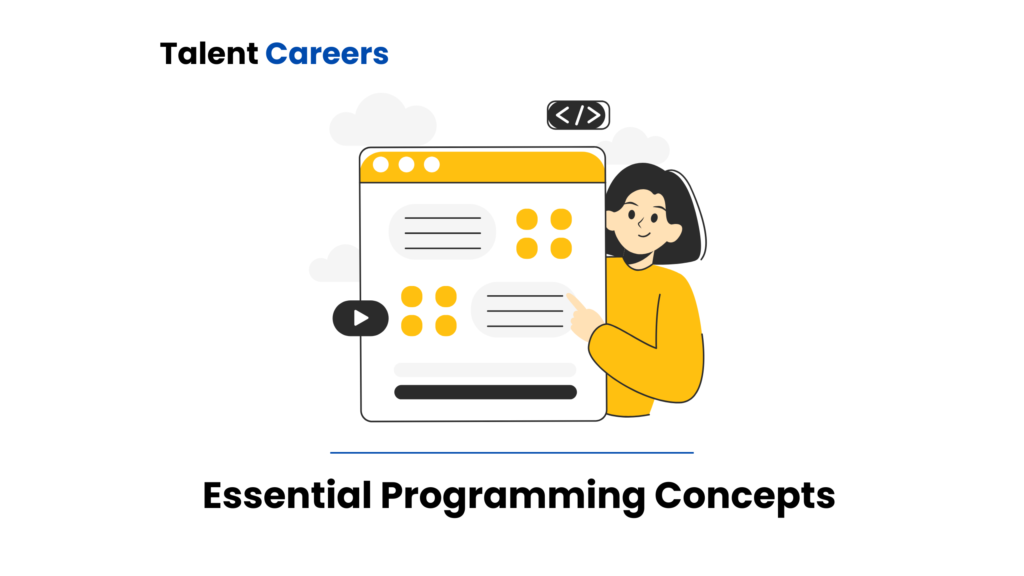Introduction
Essential Programming Concepts – For anyone new to programming, the first step is understanding a few core concepts. Mastering these ideas will help you understand how code works and allow you to build projects with confidence. This article will break down seven essential programming concepts in simple terms, helping you get comfortable with the fundamentals.

| Join Our WhatsApp Community | CLICK HERE |
| Join Our Instagram Community | CLICK HERE |
Table of Contents
1. Variables: The Building Blocks of Code
At its core, a variable is like a labeled box where you can store information you need in your code. It’s one of the most basic yet essential programming concepts for beginners to understand. Variables hold values that you can change and use throughout your program.
Let’s say you’re creating a program where you want to store your age. Instead of writing your age directly into every line of code where you need it, you can create a variable like this:
age = 25In this example, age is the variable, and 25 is the data it holds. Variables make your code more flexible, especially when values change or need to be reused. Mastering variables is one of the first programming concepts every beginner should focus on.
2. Data Types: Working with Different Kinds of Data
A data type defines the kind of value a variable can hold. It’s an important programming concepts because it tells your program how to interpret and manipulate data. Programming languages typically have a few standard data types:
- Integers: These are whole numbers like 5, -20, or 100.
- Floats: These represent numbers with decimal points, like 3.14 or 5.0.
- Strings: Strings store text, like “Hello, World!” or “Python is fun!”
- Booleans: Booleans represent either
TrueorFalse, useful for conditions.
For example, if you want to store your name, you’d use a string:
name = "Alex"Understanding data types helps you use and manipulate different kinds of data effectively, which is crucial for writing programs that work correctly.
3. Functions: Writing Reusable Code Blocks
Functions are essential programming concepts for beginners, as they allow you to write code once and reuse it whenever needed. Think of a function as a set of instructions that performs a specific task. Here’s an example of a function in Python:
def greet():
print("Hello, World!")In this example, greet() is a function that, when called, prints “Hello, World!” on the screen. To use the function, you’d call it by writing greet(). Functions can also take input (called arguments) and give output (called return values), making them versatile tools for organizing code.
Learning to create and use functions allows beginners to break down complex problems into smaller, manageable pieces, a core programming concepts.
4. Loops: Repeating Tasks with Ease
Loops are programming tools that let you repeat a block of code multiple times. There are two main types of loops beginners encounter: for loops and while loops.
- For Loop: Use this when you know how many times you want to repeat an action. For example, if you want to print “Hello” five times, you could write:
for i in range(5):
print("Hello")- While Loop: Use this when you want to repeat something until a condition is met. For example:
counter = 0
while counter < 5:
print("Hello")
counter += 1Loops are extremely useful for reducing code redundancy, making them fundamental for efficient coding.
5. Conditional Statements: Making Decisions in Code
Conditional statements allow you to make decisions in your code based on certain conditions. The most common form is the if-else statement, which lets you execute different parts of code based on whether something is true or false.
Here’s a simple example:
age = 18
if age >= 18:
print("You’re an adult.")
else:
print("You’re a minor.")In this case, if age is 18 or more, the program will print “You’re an adult.” If not, it will print “You’re a minor.” Conditional statements add flexibility and control to your code, enabling your program to react differently based on input or other conditions.
6. Arrays (or Lists): Storing Multiple Values in One Place
Arrays, or lists as they’re called in Python, let you store multiple values in a single variable. This is a powerful concept in programming as it helps you manage collections of similar data, like a list of names, numbers, or other items. Here’s an example of a list in Python:
fruits = ["apple", "banana", "cherry"]Lists are easy to work with. For example, you can access specific items in the list by their position (index), like this:
print(fruits[0]) # This will print "apple"Arrays or lists are especially useful for beginners because they introduce you to organizing and accessing data efficiently in code.
7. Debugging: Finding and Fixing Errors
Even the best programmers encounter errors, or “bugs,” in their code. Debugging is the process of finding and fixing these issues. While it can be frustrating, debugging is an essential programming skill because it helps you learn why things don’t work as expected and how to correct them.
Some tips for effective debugging:
- Use print statements to check the values of variables at different points in your program.
- Read error messages carefully; they often provide clues to the problem.
- Take breaks if you’re stuck; coming back with fresh eyes can help you spot issues more easily.
Learning to debug not only improves your problem-solving skills but also helps you understand how your code works at a deeper level.
Conclusion
By understanding and mastering these seven fundamental programming concepts, beginners gain the tools they need to build programs from scratch. Whether it’s using variables, writing functions, or debugging, these basics form the foundation for more advanced programming topics.
Also Read : 10 Simple Networking Basics Every Beginner Should Know (Essential Guide)


